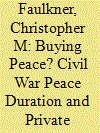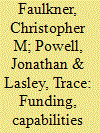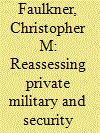| Srl | Item |
| 1 |
ID:
165693


|
|
|
|
|
| Summary/Abstract |
Do Private Military and Security Companies (PMSCs) impact peace duration after civil war? I argue that the role these organisations play in a conflict can impact post-conflict stability. Specifically, I suggest that variance in services provided by PMSCs can influence rebels’ calculations about relative capabilities. These calculations then contribute to the probability for civil war recurrence. Building on the bargaining framework, with a focus on information and commitment problems, this article demonstrates that PMSCs participating in armed combat operations can jeopardise the stability of peace following civil war. Three case narratives (Angola, Sierra Leone and Croatia) are used to probe the theoretical argument and results are illustrative – PMSCs serving as force multipliers contribute to an increase in the probability for conflict recurrence.
|
|
|
|
|
|
|
|
|
|
|
|
|
|
|
|
| 2 |
ID:
166691


|
|
|
|
|
| Summary/Abstract |
Recent years have seen increased scholarly attention given to the issue of child soldiering. Primarily dedicated to the decision-making calculus of rebel groups, this body of work has generally emphasised supply-side versus demand-side arguments. We contribute to this growing literature by explicitly investigating a previously untested aspect of the latter. Prior scholarship has made vague references to a potential association between economic endowments and child soldiering, including natural resource wealth, but scant empirical attention has been given. We argue that the specific type of endowment has important consequences for the decision to utilise child soldiers. We argue access to and exploitation of lootable natural resources (e.g. gemstones) to be especially likely to promote the use of child soldiers due to their ease of access, the low skills required to harness them and the heightened likelihood that groups will become more profit-oriented. A systematic cross-national investigation of rebel groups provides robust evidence that lootable resources such as diamonds and gemstones are strongly associated with the use of children, while non-lootable resources such as oil are not.
|
|
|
|
|
|
|
|
|
|
|
|
|
|
|
|
| 3 |
ID:
167191


|
|
|
|
|
| Summary/Abstract |
This paper challenges recent claims that competitive market dynamics incentivize Private Military and Security Companies (PMSCs) to fully commit to providing effective services, thereby reducing the duration of civil war. Our assessment of a most-likely case scenario for this argument – Sierra Leone – reveals four critical problems. First, there is rarely direct competition, even if numerous companies are present. Second, the presence of multiple PMSCs usually represents a collaboration among subsidiaries providing distinct services, often under the same corporate umbrella. Third, data aggregation obfuscates the overlap of PMSC presence, inflating the amount of perceived competition. Finally, we raise concerns regarding how quantitative analyses can conflate conflict intensity with conflict termination.
|
|
|
|
|
|
|
|
|
|
|
|
|
|
|
|